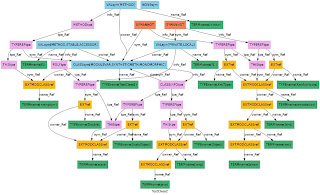Sunday, December 05, 2010
How Scala compiler stores meta information

I was always wondering how Scala compiler fits into Java class file with all it’s comprehensive language constructions. I felt there was some magic… Later in Scala 2.8 I faced a problem with calling method with default parameters using reflection. From a quick glance it seemed that there nothing complex. But wait, Scala allows methods overloading and how do you know which method has default parameters?
Here we go. There is a Pickled Scala Signature. Thought this is required information for tools, libraries and IDEs developers I found only one document dedicated to this topic. Which is most likely Scala 2.7 -> 2.8 migration manual. Prior to Scala 2.8 comiler stored
signature bytes in class file attributes called ScalaSig. According to JVM spec custom attributes are allowed since JVM simply ignores unknown attributes. With this approach implement Scala reflection was painful. You had to parse class file again (why? JVM already did it) and only then parse signature itself. As of Scala 2.8 the things get changed. ScalaSig attribute has been replaced by runtime scala.reflect.ScalaSignature annotation. The task became much more easier. Annotation has only single String attribute called bytes which contains encoded (pickled) signature (above there is reference to Scala SID which describes bytes encoding in details).
I spent some time on Scala compiler sources investigation. And created small tool which helps understanding of Scala signature. It visualizes pickle signature. You can check it out here: https://github.com/avityuk/scala-pickled-visualizer. Manual and some information on pickle format provided in README. Here I just want to show few sample output diagrams.
Default parameters:
class TestClass1 {
def met(param1: Long) = "method-1"
def met(param1: Long = 445, param2: String) = "method-2"
}
Diagram (default parameter vertex is highlighted):
Annotations:
@XmlType
class TestClass2 {
@XmlAttribute
val f1 = 150.75
}


